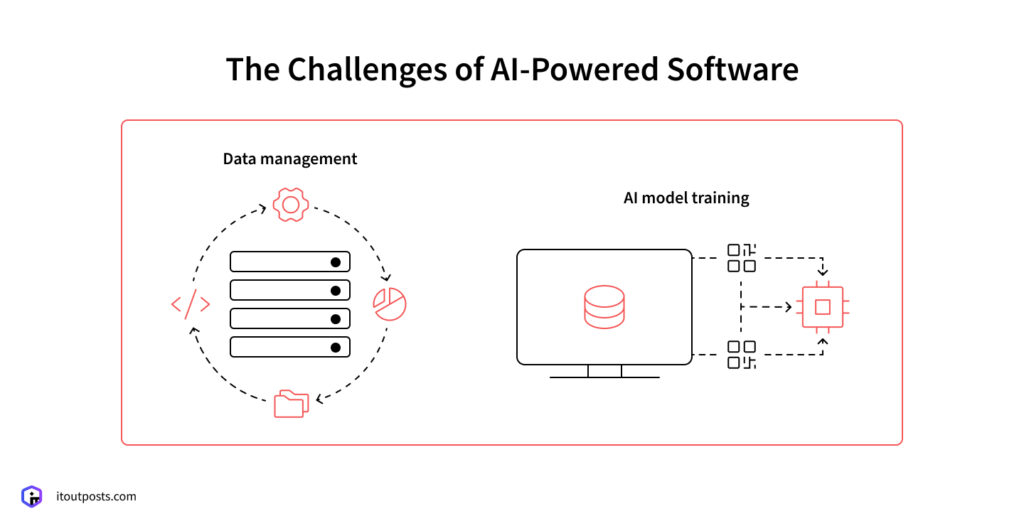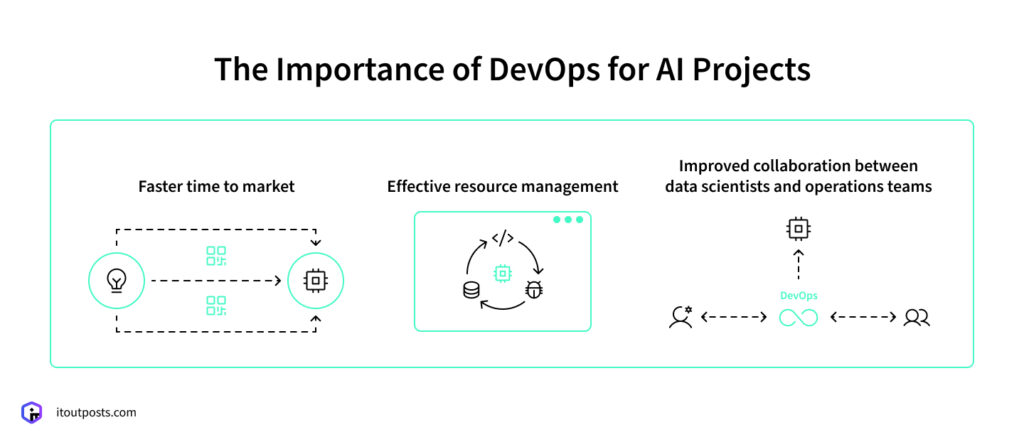Contents
In recent times, AI has become a critical component of numerous software applications. AI-driven software is changing industries and our everyday lives, from virtual assistants and recommendation systems to autonomous vehicles and fraud detection algorithms. As these applications grow in complexity, the demand for effective development and deployment has surged considerably.
Here comes DevOps, a collection of practices that merges software development with IT operations. While DevOps has revolutionized traditional software development, its importance in AI projects is even greater.
This article discusses the role of DevOps in AI development projects. We will look into the reasons why DevOps practices are instrumental for AI initiatives.

The Challenges of AI-Powered Software
Software driven by AI brings unique challenges that set it apart from regular software development. These challenges make DevOps practices not just helpful but often necessary for AI projects to succeed.
Let’s look at data management, a key issue in the AI-based development process. AI models need much data for training and testing. In traditional software, code is the main focus. But in AI projects, both code and data are equally important.
Teams need to keep track of changes, make sure the data is good quality, and keep it consistent as the project moves along. Plus, the amount of data often increases rapidly, so it can be hard to manage by hand.
DevOps practices offer good solutions to these data management problems. With strong version control systems, you can track and manage changes in datasets, making sure every change is recorded and can be traced if needed.
DevOps practices can also help you reproduce your results. By keeping detailed records of model versions, you can recreate specific conditions to check and validate the results.
Training AI models is another big challenge. It often needs a lot of computing power and can take hours or even days, depending on how complex the model is and how much data it uses.
DevOps practices are great for dealing with this challenge, too. By automating the model training process, DevOps helps get things done faster. Automated processes can handle tasks like preparing data, setting up models, and starting the training. This reduces the chance of human mistakes.
But DevOps in AI development isn’t just about data management and model training. It covers the whole life of AI projects, from initial development to production and keeping it running.

The Importance of DevOps for AI Projects
The issues associated with AI development mean that adopting DevOps practices is not only advantageous but often essential for the success of AI projects. Below are key reasons why you should consider DevOps for AI development projects.
Faster time to market
In the fast-changing field of AI, being the first to introduce a new feature or an upgraded model can let you stand out from the competition. DevOps practices automate repetitive tasks and shorten the duration between the initial idea and the launch of new AI features.
Furthermore, with continuous integration and delivery pipelines in place, you can quickly refine your models, experiment with new concepts, and release updates to production. In an AI environment where models can become obsolete rapidly, the capacity for quick iteration and deployment is vital.
Effective resource management
As we’ve mentioned previously, developing modern AI systems often requires large computational resources, particularly during the training of extensive models. With DevOps practices, you can optimize these resources and, thus, minimize costs.
This can be achieved particularly thanks to infrastructure as code. This practice enables swift provisioning of resources for model training or testing and de-provisioning them when they are no longer needed. Such resource allocation can lead to major savings, especially when using cloud resources.
Improved collaboration between data scientists and operations teams
Historically, there has often been a gap between data scientists, who create AI models, and operations teams, who deploy and maintain these models in live environments.
DevOps helps bridge this divide by nurturing a culture of teamwork and shared responsibility. It encourages data scientists to consider operational factors in the AI-based development process. At the same time, it enables operations teams to grasp the needs of AI models and provide the necessary support and infrastructure.
Examples of Successful AI Projects Using DevOps
To gain a clearer insight into how DevOps affects AI development, look at some real examples of successful AI projects that have effectively used DevOps practices.
Vidby, Recommended Vendor by YouTube
Vidby is a startup driven by AI that aims to provide real-time translation, subtitling, and dubbing services for videos and documents. At first, Vidby depended on human linguists; however, they soon realized that AI had the potential to allow them to scale their services more effectively.
However, their previous infrastructure was inflexible and based on manual code releases, which limited their ability to quickly enhance their AI models and uphold service quality.
To overcome these obstacles, Vidby collaborated with IT Outposts to establish a more agile infrastructure. This solution involved Kubernetes and Google Cloud to develop a flexible, cloud-based environment that could support rapid iterations and continuous improvement of their modern AI systems.
DreamFlare, founded by a former Google employee
DreamFlare is a streaming platform for AI-generated animated videos. The platform features distinctive options such as “flips” (animated comics) and “spins” (interactive storytelling).
Upon its launch, DreamFlare attracted considerable media attention, receiving coverage from prominent publications such as Forbes and TechCrunch. However, the startup required DevOps expertise to ensure a successful launch.
The primary task for the IT Outposts team was to establish an infrastructure that fulfilled DreamFlare’s immediate needs while also preparing for their future goals. The successful launch has confirmed the effectiveness of the DevOps practices and how a strong technical partnership can turn ambitious visions into tangible results. DreamFlare is now well-prepared to innovate in the competitive field of AI-driven entertainment.
Conclusion
As AI continues to advance and play a significant role in our software systems, organizations that successfully integrate DevOps practices into their AI development processes will be better positioned to deliver value to their users.
IT Outposts is a specialized DevOps service provider that assists organizations in implementing and optimizing DevOps practices specifically for AI projects. Our team has expertise in Kubernetes, cloud technologies, CI/CD automation, SRE, and the challenges associated with AI.
Contact us, and our team will apply the best DevOps practices, facilitating the growth of AI models.

I am an IT professional with over 10 years of experience. My career trajectory is closely tied to strategic business development, sales expansion, and the structuring of marketing strategies.
Throughout my journey, I have successfully executed and applied numerous strategic approaches that have driven business growth and fortified competitive positions. An integral part of my experience lies in effective business process management, which, in turn, facilitated the adept coordination of cross-functional teams and the attainment of remarkable outcomes.
I take pride in my contributions to the IT sector’s advancement and look forward to exchanging experiences and ideas with professionals who share my passion for innovation and success.